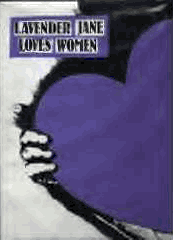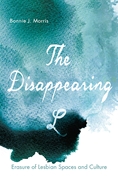
by Bonnie Morris
Feminist Soundwaves, Jewish Lesbian Voices
 As a feminist scholar whose specialty is the women’s music movement of the 1970s, 80s and 90s, I’m starting to do more and more work with museums and archives, making certain that our aging radical foremothers aren’t forgotten. Devoted fans and audiences who lived through and participated in the women’s music revolution, and who flocked to concerts and festivals just to meet other bold Amazons in the years before any LGBT rights were enshrined, may find it hard to realize our era is now historical. But the women’s music movement has just passed the 45-year mark—a timeline which really began with the energy and inventiveness of Jewish lesbian artists, producers and songwriters. In one dramatic year, 1972-73, Maxine Feldman released the lesbian anthems “Amazon” and “Angry Atthis;” the Olivia Records collective formed; and Alix Dobkin released the world’s first full-length lesbian album, “Lavender Jane Loves Women.”
As a feminist scholar whose specialty is the women’s music movement of the 1970s, 80s and 90s, I’m starting to do more and more work with museums and archives, making certain that our aging radical foremothers aren’t forgotten. Devoted fans and audiences who lived through and participated in the women’s music revolution, and who flocked to concerts and festivals just to meet other bold Amazons in the years before any LGBT rights were enshrined, may find it hard to realize our era is now historical. But the women’s music movement has just passed the 45-year mark—a timeline which really began with the energy and inventiveness of Jewish lesbian artists, producers and songwriters. In one dramatic year, 1972-73, Maxine Feldman released the lesbian anthems “Amazon” and “Angry Atthis;” the Olivia Records collective formed; and Alix Dobkin released the world’s first full-length lesbian album, “Lavender Jane Loves Women.”
How should we mark this unique legacy? Early in 2017, I had the unique opportunity to present an exhibit and lecture at the Library of Congress, in Washington, D.C., showcasing feminist songsheets and rare albums. The exhibit, three glass cases in the Great North Hall of the original Jefferson Building, allowed visitors to see the arc of vocal activism from suffrage songs to the founding of Olivia Records to the era of vinyl albums, as well as excerpts from women’s music books and magazines that reported on concerts and festivals in the era of lesbian feminism. With the invaluable support and assistance of Library of Congress staff specialist Meg Metcalf, whom I met through D.C.’s Rainbow History project, we put together a display that thousands of visitors encountered from January 27 to April 2.
 My recent book The Disappearing L makes clear that this movement of woman-identified music began with Jewish leadership. Two of the first feminist rock groups (both of which played on the 1972 album Mountain Moving Day) were the Chicago Women’s Liberation Rock Band (with Susan Abod, Stephanie Hirsch, and Naomi Weisstein) and the New Haven Women’s Liberation Rock Band (with Susan Abod’s sister, Jennifer Abod, plus Frederica Alper, Harriet Cohen and Leah Margulies.) In that same year, Jewish stand-up comedian Robin Tyler produced Maxine Feldman’s groundbreaking lesbian 45 r.p.m. recording “Angry Atthis,” the flip side of which was “Amazon,” eventually the opening anthem of the Michigan Womyn’s Music Festival. I’ve mentioned that in 1973, Alix Dobkin released “Lavender Jane Loves Women”, the first full-length lesbian album ever recorded, and back in my city of Washington, D.C., Ginny Berson left the lesbian-separatist Furies collective and joined with Judy Dlugacz to form an independent women’s music collective, Olivia. They soon relocated to the West Coast, and eventually Olivia expanded into the hugely successful travel company it is today, creating the first all-lesbian cruise ship experience.
My recent book The Disappearing L makes clear that this movement of woman-identified music began with Jewish leadership. Two of the first feminist rock groups (both of which played on the 1972 album Mountain Moving Day) were the Chicago Women’s Liberation Rock Band (with Susan Abod, Stephanie Hirsch, and Naomi Weisstein) and the New Haven Women’s Liberation Rock Band (with Susan Abod’s sister, Jennifer Abod, plus Frederica Alper, Harriet Cohen and Leah Margulies.) In that same year, Jewish stand-up comedian Robin Tyler produced Maxine Feldman’s groundbreaking lesbian 45 r.p.m. recording “Angry Atthis,” the flip side of which was “Amazon,” eventually the opening anthem of the Michigan Womyn’s Music Festival. I’ve mentioned that in 1973, Alix Dobkin released “Lavender Jane Loves Women”, the first full-length lesbian album ever recorded, and back in my city of Washington, D.C., Ginny Berson left the lesbian-separatist Furies collective and joined with Judy Dlugacz to form an independent women’s music collective, Olivia. They soon relocated to the West Coast, and eventually Olivia expanded into the hugely successful travel company it is today, creating the first all-lesbian cruise ship experience.
Whether or not a women’s music festival, concert or conference planned on including narratives of Jewish women’s history, Jewish women were very dominant both onstage and behind the scenes: Alix Dobkin, Sue Fink, Phranc, Maxine Feldman, Marla BB, Lynn Lavner, Laura Berkson, Ronnie Gilbert, Sonia Rutstein, Debbie Fier, Jean Fineberg, comedians Judith Sloan and Sara Cytron. The stage lighting might be designed by K.C. Cohen and assisted by Lauren Heller, the sound engineered by Karen Kane and/or provided by Pan Conrad and Laurie Bennett. Or the stage might be managed by Brynna Fish, with emcee humor offered by Amy and Elizabeth Ziff of BETTY, and the entire festival produced by a Jewish lesbian (Amy Horowitz, Havens Levitt, Robin Tyler, Lin Daniels). The distribution of the women’s music for sale at many festivals was handled by Laurie Fuchs, who started the Ladyslipper company and mail-order catalogue; in the 2002 film Radical Harmonies, Fuchs expressed the exhaustion of her early years in wry Yiddish terms: “We just schlepped albums from one place to another.” Even sign language interpretation, which became an essential part of making all of festival culture accessible, proved to be a very Jewish field. The initiative to place A.S.L. interpreters onstage first came from Susan Freundlich, who was soon joined by Laurie Rothberg, Jody Steiner, Risa Shaw, Jennifer Jacobs, Joy Duskin, Cat Dvar, Felice Shays and Joan Wattman. (Festivals took the lead in assuring complete accessibility, but it’s worth noting that the Americans with Disabilities Act was written by a Jewish lesbian, the lawyer Chai Feldblum.)
Despite the range of Jewish talent, fear of backlash prevented many women from stating the obvious: that Jewish energy fueled much of lesbian cultural activism. Only a few artists even mentioned their Jewishness onstage. “Why cause trouble?” one woman confided in me; “After all, we’re already accused of running the media.” But there were certainly exceptions. During each of her own concerts, Alix Dobkin deliberately paused at the third song in her set to say, “Jews and lesbians have much in common: we were never meant to survive.” Other artists also signified. Phranc, who started out as little Susie Gottlieb in my Mar Vista neighborhood of West Los Angeles, had a press kit describing herself as “your basic all-American Jewish Lesbian folksinger,” and often performed the song “Take Off Your Swastika.” Pianist Laura Berkson sang lovingly of Miriam’s journey; comedian Judith Sloan’s stage character Sophie invoked everybody’s Jewish grandmother. For thirty years as an activist and scribe in the women’s music movement I collected and saved as much of this material culture as I could, while also facilitating a Jewish women’s networking series at three different festivals annually.
It was a challenge for me to cram at least some of these artists into the limitations of three glass cases covering 100 years of feminist music; but a thrill to stand in the Library of Congress and watch visitors from all over the world gape at Alix Dobkin’s “Living With Lesbians” album, proudly on display in a federal building. Some of my rare recordings are now part of the Performing Arts Reading Room at the Library of Congress and others are being donated to the Smithsonian; still more will be part of my personal legacy willed to the Schlesinger Library at Radcliffe. As we mourn the passing of daring artists like Maxine Feldman and Ronnie Gilbert, archives and exhibits must make clear the sound of Jewish women’s protest: from suffrage march to vinyl to LGBT rights.
The views and opinions expressed in this article are the author’s own and do not necessarily reflect those of Lilith Magazine.